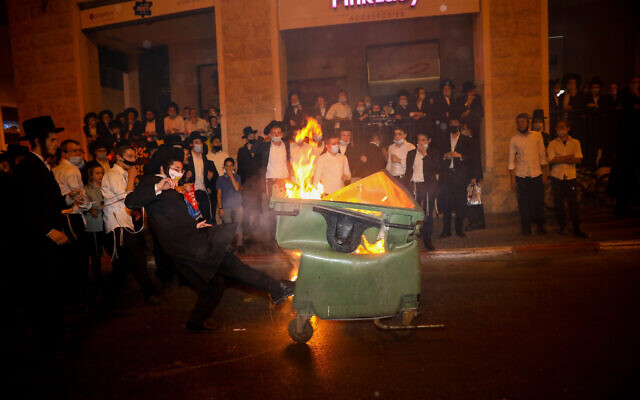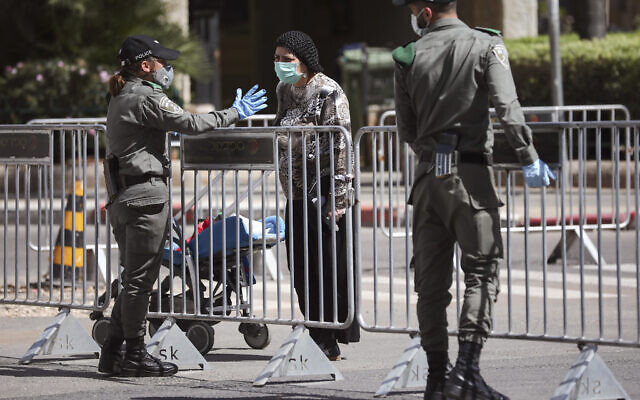Investigation opened into case of apparent excessive force comes days after another incident caught on tape in which officer whacked protester who told him to wear a mask
For the second time this week, police on Tuesday announced the suspension of an officer filmed using what appeared to be excessive force during an ultra-Orthodox protest against the government’s shuttering of their communities amid the coronavirus pandemic.
In the latest incident, which took place on Monday evening, an officer was seen giving a hard shove to an unsuspecting Haredi photographer from behind and knocking him to the ground.
Police said they had suspended the officer and opened up an investigation into the incident.
On Saturday evening, another officer was filmed whacking a Haredi protester in the face with the back of his hand after the demonstrator told him to wear a mask. After that incident as well, an investigation was opened by the Justice Ministry’s Internal Investigations Department and the cop has been suspended in the interim.
פעם הבאה שתעירו לשוטר/חייל שהוא הולך בלי מסכה במרחב הציבורי תסתכנו באגרוף לפנים, תהיו זהירים. pic.twitter.com/1eCb1abMWY
— אריאל אלחרר (@ariel_elharar_) July 12, 2020
Ultra-Orthodox men and boys in Jerusalem have staged protests against government lockdowns on three consecutive evenings, with Monday’s demonstration including the arrests of 16 participants.
Demonstrators were seen kicking burning dumpsters on wheels toward Border Police forces, who, in some cases, kicked them back.
“We won’t give up, this is a war for our home and we won’t allow discrimination in the Jewish state,” a protester told ultra-Orthodox news site Kikar Hashabbat. “We will take every measure until the lockdown is lifted and police start treating us like human beings.”
On Friday, lockdowns went into effect in select neighborhoods in five cities, including Haredi enclaves in Jerusalem and Beit Shemesh. The government had also previously sealed off the ultra-Orthodox West Bank settlement of Beitar Illit, and ultra-Orthodox neighborhoods in Ashdod.
לילה שלישי של עימותים בירושלים: המשטרה עצרה חשוד בהפרת סדר במחאה בצומת ירמיהו-שמגר. מפגינים דרדרו פחים בוערים לעבר שוטרים – שבעטו אותם לכיוונם בחזרה
(צילום: דוד פרלמוטר, מחאות החרדים) @VeredPelman pic.twitter.com/ErPOUWrbpp— כאן חדשות (@kann_news) July 13, 2020
On Saturday, 10 people were arrested as ultra-Orthodox demonstrators clashed with police. Hundreds of protesters blocked the intersection of Yirmiyahu and Shamgar streets, and threw stones, eggs, and other objects at officers who were responding to the situation, the Israel Police said in a statement. Some of the protesters tore down police barricades that had been set up to enforce the lockdowns, the statement said.
On Sunday, at least two more people were arrested, as hundreds of ultra-Orthodox Jews set trash cans on fire and knocked down barriers to protest the closures.

Also Monday, ultra-Orthodox lawmakers demanded that Prime Minister Benjamin Netanyahu work to stop what they called biased and selective enforcement of public health regulations that unfairly targets their community.
MKs from the ultra-Orthodox Shas and United Torah Judaism (UTJ) parties met Netanyahu alongside Health Minister Yuli Edelstein and Public Security Minister Amir Ohana, following days of complaints and threats by some lawmakers that they could bolt the coalition.
During the height of the first wave, the cities of Beit Shemesh, Elad and Modiin Illit each had more active cases than Tel Aviv, the country’s second-largest population center. In April, the ultra-Orthodox city of Bnei Brak was put under a closure order, as were several predominantly Hasidic neighborhoods in Beit Shemesh.

In a statement Monday, the Prime Minister’s Office said that prior to future closures, consultations would be held with representatives of the ultra-Orthodox community, and, if possible, command centers would be opened in the affected communities themselves.
As reported by The Times of Israel
